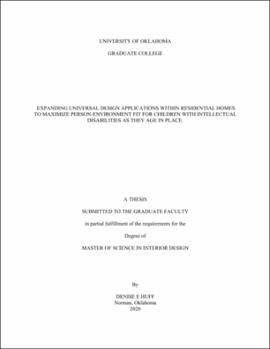| dc.contributor.advisor | Ellis, Natalie | |
| dc.contributor.author | Huff, Denise | |
| dc.date.accessioned | 2020-07-27T14:32:56Z | |
| dc.date.available | 2020-07-27T14:32:56Z | |
| dc.date.issued | 2020-07-30 | |
| dc.identifier.uri | https://hdl.handle.net/11244/325301 | |
| dc.description.abstract | Children with intellectual disabilities often have specified needs that could potentially benefit from design modifications to the home. The study’s purpose is to identify the design challenges that can be held within single-family residential homes from the perspective of the primary caregivers of children with intellectual disabilities. The participating caregivers provide a voice for the children with varying diagnosis, level of autonomy and range of abilities. Among the caregivers interviewed, three common themes emerged: 1) keeping the child safe, 2) maintaining a sense of normalcy and 3) providing an appropriate level of independence or autonomy. The seven principles of universal design were then evaluated within the three categories to determine the correlation of person-environment congruence within single-family residential homes. The research supports design considerations that align with the needs of individuals with intellectual disabilities living in multi-generational; single-family homes, including home renovations and new home construction, inclusive of the furniture, fixtures and equipment (FF&E). The study incorporates prior research relevant to occupants diagnosed with intellectual disabilities, and new information was gathered from the study’s participants during face to face interviews. Due to the limited number of participants and the variety of intellectual disabilities represented, the results of this qualitative study cannot be generalized; however, the research follows an emergent design process that provides a framework process for future knowledge and policy contributions. | en_US |
| dc.language | en_US | en_US |
| dc.rights | Attribution-NoDerivatives 4.0 International | * |
| dc.rights.uri | https://creativecommons.org/licenses/by-nd/4.0/ | * |
| dc.subject | Intellectual disabilities | en_US |
| dc.subject | Universal design | en_US |
| dc.subject | single-family residential homes | en_US |
| dc.subject | Aging in place | en_US |
| dc.title | Expanding universal design applications within residential homes to maximize person-environment fit for children with intellectual disabilities as they age in place | en_US |
| dc.contributor.committeeMember | Bhattacharjee, Suchismita | |
| dc.contributor.committeeMember | Scott-Howard, Tracy | |
| dc.date.manuscript | 2020-07-23 | |
| dc.thesis.degree | Master of Science in Interior Design | en_US |
| ou.group | Christopher C. Gibbs College of Architecture | en_US |
| shareok.orcid | https://orcid.org/0000-0001-9299-7837 | en_US |
| shareok.nativefileaccess | restricted | en_US |

